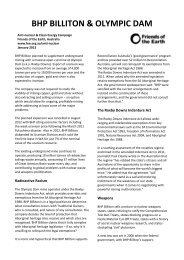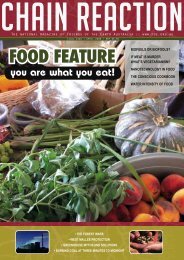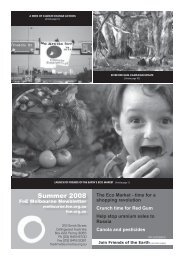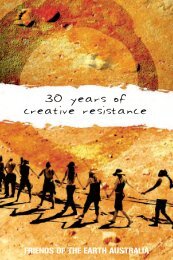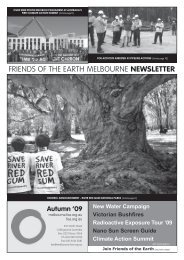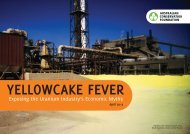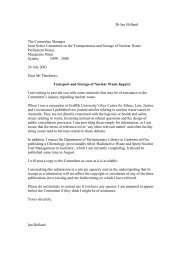Yellowcake Country? - Friends of the Earth Australia
Yellowcake Country? - Friends of the Earth Australia
Yellowcake Country? - Friends of the Earth Australia
You also want an ePaper? Increase the reach of your titles
YUMPU automatically turns print PDFs into web optimized ePapers that Google loves.
Introduction.<br />
Mine, mine, all mine.<br />
In August 2005, federal Resources Minister Ian<br />
Macfarlane declared <strong>the</strong> Nor<strong>the</strong>rn Territory<br />
“open for business” to <strong>the</strong> uranium mining<br />
industry. It was a dramatic gesture, and made<br />
front-page news. In fact, <strong>the</strong> Commonwealth<br />
already owns Territory uranium but has no<br />
power to licence, approve or regulate proposed<br />
new mines. It remains to be seen if <strong>the</strong> NT Labor<br />
Government has <strong>the</strong> political will to honour its<br />
‘no new mines’ election promise.<br />
Macfarlane’s announcement drew attention<br />
to a wave <strong>of</strong> uranium exploration — underway<br />
since 2004 in <strong>the</strong> NT, Western <strong>Australia</strong>n, South<br />
<strong>Australia</strong> and Queensland — driven by a sharp<br />
increase in uranium prices.<br />
Meanwhile, influential federal ministers<br />
have encouraged a debate about nuclear power<br />
and climate change. A domestic nuclear power<br />
industry is a distant reality. As Clive Hamilton<br />
from <strong>the</strong> <strong>Australia</strong> Institute said, “By having<br />
this debate in <strong>Australia</strong>, although we’re not<br />
going to have nuclear power plants here, we<br />
are s<strong>of</strong>tening public attitudes to nuclear power<br />
elsewhere. And so, why shouldn’t we export<br />
uranium to <strong>the</strong>m”<br />
Let’s encourage a public debate, instead,<br />
about uranium mining and exports.<br />
<strong>Australia</strong> holds an estimated 40 per cent <strong>of</strong><br />
<strong>the</strong> world’s uranium deposits. Since <strong>the</strong> early<br />
1980s, <strong>the</strong> Labor Party’s opposition to any new<br />
uranium mines, as well as a sluggish market,<br />
has largely kept mining companies away. Since<br />
1996, <strong>the</strong> current federal government has<br />
actively supported <strong>the</strong> development <strong>of</strong> new<br />
mines (in addition to existing mines Ranger,<br />
in <strong>the</strong> NT, and Olympic Dam (Roxby Downs) in<br />
SA). However, only one new uranium mine has<br />
opened in <strong>the</strong> past decade — Beverley, also in SA.<br />
Labor’s policy is under pressure from<br />
within, in <strong>the</strong> lead-up to <strong>the</strong> party’s April 2007<br />
national conference. Labor currently holds<br />
power in all states and territories; this internal<br />
policy debate is <strong>of</strong> great significance to <strong>the</strong><br />
future <strong>of</strong> uranium mining in <strong>Australia</strong>.<br />
In April 2006, <strong>the</strong> Howard Government<br />
concluded a uranium export deal with <strong>the</strong><br />
Chinese Communist regime. Since <strong>the</strong>n, it<br />
has threatened to use Commonwealth trade<br />
or foreign affairs powers to wrest control <strong>of</strong><br />
uranium mining from <strong>the</strong> states and territories.<br />
The government has also convened a uranium<br />
industry steering committee, largely made up <strong>of</strong><br />
mining company representatives, to advise on<br />
removing impediments to industry expansion.<br />
It’s a good time to reflect: Why did <strong>the</strong><br />
issue <strong>of</strong> uranium mining inspire hundreds <strong>of</strong><br />
thousands <strong>of</strong> <strong>Australia</strong>ns to take <strong>the</strong> streets<br />
with banners and bad haircuts in <strong>the</strong> 1970s<br />
and 80s What brought thousands <strong>of</strong> people to<br />
<strong>the</strong> Jabiluka blockade in support <strong>of</strong> <strong>the</strong> Mirarr<br />
people in 1998<br />
The environmental track record at existing<br />
uranium mines confirms public concerns.<br />
In 2002, a Senate committee examined <strong>the</strong><br />
regulation, monitoring and reporting <strong>of</strong><br />
environmental impacts at Ranger and Beverley,<br />
in response to numerous leaks and spills. Its<br />
2003 report identified “a pattern <strong>of</strong> underperformance<br />
and non-compliance” as well<br />
as “many gaps in knowledge and an absence<br />
<strong>of</strong> reliable data on which to measure <strong>the</strong><br />
extent <strong>of</strong> contamination or its impact on <strong>the</strong><br />
environment”. The severity <strong>of</strong> <strong>the</strong> shortcomings<br />
suggested to <strong>the</strong> committee “that short-term<br />
considerations have been given greater weight<br />
than <strong>the</strong> potential for permanent damage to <strong>the</strong><br />
environment”.<br />
Consider that, so far, <strong>the</strong> Ranger mine has<br />
produced over 30 million tonnes <strong>of</strong> radioactive<br />
tailings waste, and Olympic Dam has produced<br />
over 60 million tonnes. Serious questions about<br />
<strong>the</strong> long-term management <strong>of</strong> toxic tailings<br />
remain unanswered.<br />
While <strong>the</strong> Cold War is behind us, <strong>the</strong> issue<br />
<strong>of</strong> nuclear weapons proliferation is just as<br />
troubling today. Howard has even suggested that<br />
he may be willing to deal with nuclear weapons<br />
state India, which is not a signatory to <strong>the</strong><br />
Nuclear Non-Proliferation Treaty.<br />
Aboriginal communities have spoken out<br />
against uranium mining for decades. The<br />
industry’s dealings with Traditional Owners<br />
and communities have prompted broader<br />
public unease. For example, members <strong>of</strong> <strong>the</strong><br />
Adnymathanha community have described<br />
<strong>the</strong> Beverley consultation process <strong>of</strong> <strong>the</strong> late<br />
1990s as top-down, divisive, and engineered to<br />
‘disempower’ <strong>the</strong> Adnymathanha people that<br />
opposed <strong>the</strong> mine. In June 2000, <strong>the</strong> late Mr<br />
Artie Wilton, who was <strong>the</strong> last Wilyaru man,<br />
or fully initiated Adnyamathanha man, stated<br />
publicly that he was never consulted about<br />
Beverley and never agreed to its construction.<br />
“The Beverley Mine must be stopped, dead<br />
stopped,” Mr Wilton said.<br />
Finally, <strong>Australia</strong>’s uranium is converted<br />
into high-level nuclear waste in nuclear power<br />
reactors. There’s pressure on <strong>Australia</strong> to<br />
accept <strong>the</strong> world’s nuclear waste. If <strong>Australia</strong><br />
is happy to export <strong>the</strong> ore, runs <strong>the</strong> argument,<br />
<strong>the</strong>n it needs to also shoulder <strong>the</strong> responsibility<br />
<strong>of</strong> dumping its detritus.<br />
What can we learn from <strong>the</strong> past What are<br />
our responsibilities to <strong>the</strong> future<br />
Eve Vincent<br />
Beyond Nuclear Initiative, 2006<br />
Page 1



